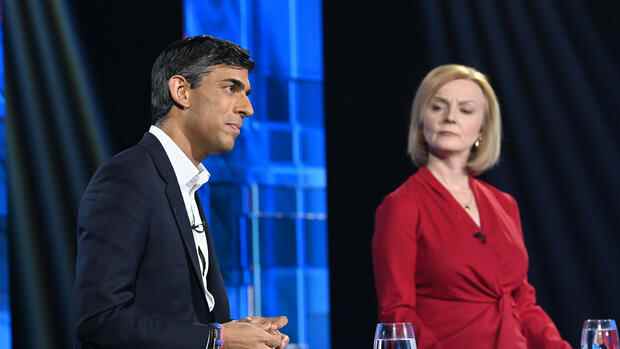The two ministers from Johnson’s cabinet want to succeed him.
(Photo: dpa)
London Britain’s next Prime Minister will be either Rishi Sunak or Liz Truss. The two Conservative politicians prevailed in the last round of voting within the Tory faction and are now entering the final vote.
By September 5th, around 175,000 members of the Conservative Party must vote by post to determine the new party leader, who will succeed the resigned Boris Johnson as Prime Minister at 10 Downing Street after the parliamentary summer recess. Johnson made his final appearance in the House of Commons on Wednesday.
Former Finance Minister Sunak received 137 votes, while British Foreign Secretary Truss received 113 of the 357 Tory MPs. She just overtook the remaining Penny Mordaunt, who received 105 votes and had been second behind Sunak for a long time.
The two finalists prevailed against six competitors in a total of five voting rounds. In an internal party election campaign, they will now try to win as many of the predominantly older, male and Eurosceptic party members as possible over to their side.
Top jobs of the day
Find the best jobs now and
be notified by email.
According to the most recent polls, Truss, who is supported by the party’s right wing, has better chances at the base than Sunak, who appears technocratic and has often been criticized by conservative party friends for his tax increases.
Boris Johnson, still Prime Minister of Great Britain, spoke for the last time during the weekly Question Time on Wednesday.
(Photo: dpa)
However, the former Chancellor of the Exchequer is valued for his economic policy expertise and is considered by the Conservative faction to be the person most likely to lead Great Britain out of the worst economic crisis in 50 years.
In June, consumer prices increased by 9.4 percent. “We expect a further increase to eleven percent by October”; said James Smith, an economist at Dutch bank ING. The British trade unions are trying to prevent a further loss of real wages for their members with numerous strikes.
The Bank of England is considering raising interest rates by half a percentage point to 1.75% at its next meeting in early August in order to get inflation under control. The Organization for Economic Development and Cooperation (OECD) forecasts that economic growth will come to a standstill in the coming year.
The fight against the economic crisis and the sharp rise in the cost of living should therefore also determine the finale in the struggle for Downing Street. The central question is whether tax cuts for consumers and companies can slow down the economic downturn without fueling inflation further. While Sunak is defending the tax increases he has initiated in view of the tense situation in state finances, Truss has promised the conservative party base that taxes will be reduced.
The Foreign Secretary, who does not always seem perfectly prepared during TV debates on economic issues, has announced tax breaks of more than £30 billion a year. Among other things, she wants to reverse the increase in social security contributions pushed through by Sunak and cancel the increase in corporation tax from 19 to 25 percent planned by her rival.
Controversy over tax cuts
The tax cuts should largely finance themselves through higher growth. In addition, Truss apparently wants to extend the repayment of the national debt and help determine the monetary policy course of the British central bank. The Foreign Secretary received support for her proposals from outgoing Prime Minister Johnson, who also campaigned for tax breaks when he left.
Truss’ economic policy proposals, on the other hand, were not only heavily criticized by her rival Sunak. The former finance minister has branded the funding plans for the tax hikes as “fairy tale economics” and has promised to focus on fighting inflation.
Michael Saunders, member of the Bank of England’s Monetary Policy Council, warned against questioning the central bank’s independence. And Citibank chief economist, Benjamin Nabarro, called Truss’ policy platform the “biggest risk” to the UK economy. .
More: Planned to power: The perfectionist of Downing Street is now very close to his big goal
